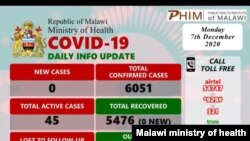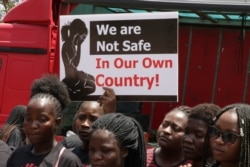Malawi has seen a drop in confirmed COVID-19 infections, despite increasing numbers of people ignoring rules on social distancing, wearing masks and washing hands. Some worry the growing complacency could lead to a second wave of the virus.
Juliet Masamba, a secondary school learner in Ndirande Township, stopped wearing a face mask in September after Malawi’s government reopened schools and airports and lifted restrictions on social gatherings.
She says this is because the COVID-19 cases here in Malawi are going down.
"Even the statistics of those who are dying of the disease are not threatening. This makes me believe that the outbreak is gone and cannot come back," she said.
Malawi has for the past three months registered a dramatic drop in coronavirus infections. From a total of 1,065 active cases on October 3, the country’s total caseload has dropped to just 45 as of December 7. More than 5,000 people have recovered, while the death toll stands at 185.
New confirmed cases are now ranging between one and four per day. Sometimes days pass without a recorded infection.
Maziko Matemba, who heads Malawi’s Health and Rights Education Program, attributes the drop in new infections to declining COVID-19 testing.
“Our testing capability is not as high as we would expect by now because we haven’t even hit 50,000 or 100,000 people. By now, maybe, we should have one million people tested but you know our testing is targeted,” he said.
Malawi, with a population of 18 million, is currently only testing those with COVID-19 symptoms largely because of shortage of testing kits.
Dr. Charles Mwansambo, the principal secretary in the Ministry of Health, says the testing drop is because of the government’s early enforcement of measures like closing schools, restricting public gatherings, and mandating people wear face masks in public places.
But he worries about growing complacency in Malawi.
“You know, that’s a big concern, we are not out of the woods yet. I mean we still have COVID around and still have to follow all the public health measure that we have put in place. We have seen that people have relaxed a lot which is very dangerous for us. We still have the virus around and it probably has potential of spreading very quickly,” he said.
Meantime, Malawi’s government has intensified its campaign to remind people on the need to adhere to all COVID-19 preventive measures, like hand washing, observing social distancing and wearing face coverings.





